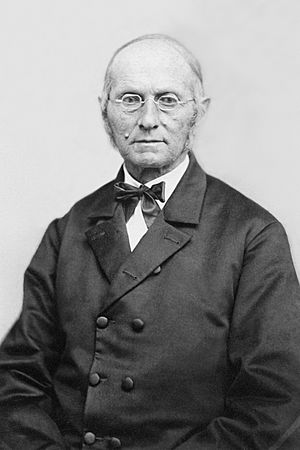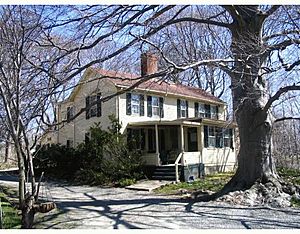Joseph Bates (Adventist) facts for kids
Quick facts for kids Joseph Bates |
|
|---|---|

Joseph Bates
|
|
| Personal details | |
| Born | July 8, 1792 Rochester, Massachusetts |
| Died | March 19, 1872 (aged 79) Battle Creek, Michigan |
| Occupation | Pastor, sailor, author, teacher |
Joseph Bates (born July 8, 1792 – died March 19, 1872) was an American sailor and a Christian minister. He helped start and develop a religious movement called Sabbatarian Adventism. People who followed this movement later formed the Seventh-day Adventist Church. Joseph Bates also helped convince James White and Ellen G. White that the seventh-day Sabbath was important.
Contents
Joseph Bates: Sailor and Minister
Joseph Bates was born in Rochester, Massachusetts on July 8, 1792. His father, also named Joseph, fought in the Revolutionary War. His mother was the daughter of Barnabas Nye. In 1793, Bates' family moved to an area that later became Fairhaven. In June 1807, Bates began his sailing career. He sailed as a cabin boy on a ship called the Fanny.
Life at Sea and New Beliefs
In 1811, Bates was forced to serve in the British navy. He also spent time as a prisoner during the War of 1812. After he was released, he continued his career. He eventually became the captain of a ship. During one of his trips, he read a Bible that his wife had packed for him. This experience changed his life. He became involved in many social reforms.
He helped start an early temperance group. This group worked to encourage people to drink less alcohol. Bates also believed strongly that the church and government should be separate. He was a big supporter of abolition, which meant ending slavery.
Health and Faith Journeys
As a sailor, Bates saw many problems caused by too much drinking. He became a champion of health reform. He stopped using alcohol, tobacco, and caffeine. He even became a vegetarian. In 1839, he accepted the teachings of William Miller. Miller taught that Jesus would return to Earth soon.
After October 22, 1844, many people, including Bates, were disappointed. This event is known as the Great Disappointment. In the spring of 1845, Bates learned about the seventh-day Sabbath. He read a pamphlet by T. M. Preble about it.
The Apostle of the Sabbath
Bates soon became known as the "apostle of the Sabbath." He wrote several booklets on the topic. One of his first booklets, published in 1846, was called The Seventh Day Sabbath, a Perpetual Sign. Bates made an important connection between the Sabbath and a special understanding of the heavenly sanctuary. This idea became known as the Great Controversy theme.
At first, Bates was not sure about Ellen G. White and her prophetic gift. But he became convinced when he saw her have a vision of several planets. He helped with early church writings, like A Word to the "Little Flock." Bates worked with the Whites at Bible Conferences from 1848 to 1850. These meetings are known as the Sabbath and Sanctuary Conferences.
Forming the Church
In the 1850s, Bates supported creating a more formal church organization. This led to the formation of the Seventh-day Adventist Church in 1863. Joseph Bates passed away on March 19, 1872, in Battle Creek, Michigan. He is buried in Poplar Hill Cemetery in Monterey, Michigan.
Today, Bates' family home in Fairhaven, Massachusetts, is being restored. It will be a heritage attraction for visitors.
See also
 In Spanish: Joseph Bates para niños
In Spanish: Joseph Bates para niños
- Seventh-day Adventist Church
- Seventh-day Adventist theology
 | John T. Biggers |
 | Thomas Blackshear |
 | Mark Bradford |
 | Beverly Buchanan |


